 Weird Stuff
Weird Stuff  Weird Stuff
Weird Stuff  The Arts
The Arts 10 Great Movies That Were Made into Bad Musicals
 Miscellaneous
Miscellaneous 10 Hilarious Excuses Firms Once Gave to Cover Up Their Bad Deeds
 Health
Health 10 Fascinating Facts About Accidental Medical Discoveries
 Our World
Our World 10 Iconic Landmarks That Were Nearly Called Something Else
 Music
Music 10 Musicians Who Became Famous After Death
 Crime
Crime 10 Scientists Convicted of Serious Crimes
 Travel
Travel 10 Formerly Secret Tunnels That Are Now Open to the Public
 Technology
Technology 10 Amazing New Uses for AI
 Pop Culture
Pop Culture 10 Male Heartthrobs Who Became Known for Something Else
 Weird Stuff
Weird Stuff 10 Ridiculous Things Hackers Have Controlled Remotely
 The Arts
The Arts 10 Great Movies That Were Made into Bad Musicals
 Miscellaneous
Miscellaneous 10 Hilarious Excuses Firms Once Gave to Cover Up Their Bad Deeds
Who's Behind Listverse?

Jamie Frater
Head Editor
Jamie founded Listverse due to an insatiable desire to share fascinating, obscure, and bizarre facts. He has been a guest speaker on numerous national radio and television stations and is a five time published author.
More About Us Health
Health 10 Fascinating Facts About Accidental Medical Discoveries
 Our World
Our World 10 Iconic Landmarks That Were Nearly Called Something Else
 Music
Music 10 Musicians Who Became Famous After Death
 Crime
Crime 10 Scientists Convicted of Serious Crimes
 Travel
Travel 10 Formerly Secret Tunnels That Are Now Open to the Public
 Technology
Technology 10 Amazing New Uses for AI
 Pop Culture
Pop Culture 10 Male Heartthrobs Who Became Known for Something Else
10 People Who Lived In An Airport
An airport is not an ideal home. Unfortunately, some people have no choice but to live in one. A few simply aren’t allowed to leave until their paperwork is sorted out. Others have nowhere else to go. The following people spent weeks, months, and even years calling an airport home.
10 Zahra Kamalfar
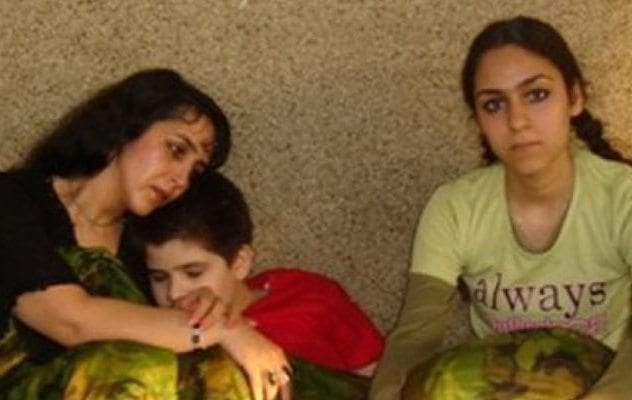
Zahra Kamalfar and her husband attended a protest against the Iranian government in 2004. They were both arrested. Two years later, Kamalfar was given a two-day pass to visit her family. They told her that her husband had been executed. She decided to flee the country.
Kamalfar obtained false documents for her family. She and her children boarded a plane to Canada, where her brother lived. The family had to switch flights in both Russia and Germany. They managed to pass through the Russian airport. However, the Germans realized that their documentation was fake, and the family was sent back to Russia.
The Russians wanted to send them back to Iran, but the family didn’t have any travel or ID documents. The Russians tried to force them to sign documents that would send the family back to Iran. They then moved the family to the public area of the travel lounge. The Kamalfars slept on the floor, bathed in the bathrooms, and ate donated food.
Kamalfar applied for refugee status from the United Nations, but she was turned down. She appealed the decision, and she and her family were granted refugee status. After spending 10 months trapped in a Russian airport, Kamalfar and her children were finally allowed to emigrate to Canada.
9 Feng Zhenghu
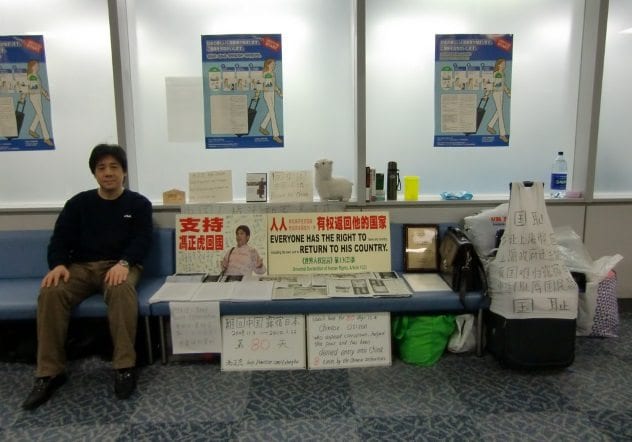
In 2009, Feng Zhenghu traveled to Japan to receive medical treatment. When he tried to return to China, he wasn’t allowed to enter the country. Zhenghu booked another flight, and again, he wasn’t allowed to enter. He ultimately tried to go home eight times. Four times, China sent him back, and the other four times, he wasn’t allowed to board the plane. He refused to enter Japan after his last attempt; Zhenghu chose to wait in the airport until Chinese officials allowed him to go home.
It was going to take a while. Zhenghu was a human rights activist who had written several pieces that were critical of the Chinese government. He’d reported on government officials’ violations of the law, and he’d composed volumes of 430 cases that described how citizens’ civil rights had been violated.
Zhenghu’s airport stay was unpleasant. He only had tap water to sustain himself for the first few days; Japanese officials refused to accept his money for food. He had to rely on the kindness of strangers to survive. Many people gave him goods, although nothing could improve his sleeping situation. Zhenghu slept on a steel bench, and he could only rest between 11:00 PM and 5:00 AM. The airport was almost always busy.
After he had spent 92 days in the Japanese airport, he was allowed to return home. He did not receive a warm welcome. Zhenghu was placed under surveillance for a year. Then his phones and computers were confiscated, and he was placed under house arrest.
8 Mohammed Al-Bahish

Palestinian Mohammed al-Bahish met a woman on vacation in 2013, and the two made plans to marry. Al-Bahish booked a plane to Kazakhstan, where his girlfriend lived. The pair went to register their intention to marry. Then al-Bahish discovered that his refugee travel documents were missing, and his Kazakh visa had expired.
He flew to Turkey to renew his Kazakh visa, but he was turned back at the border and sent back to Kazakhstan. The Kazakhs wouldn’t let him enter the country because he didn’t have a visa. He had nowhere else to go, either: Israel wouldn’t let him travel to the Palestinian territories.
Al-Bahish was trapped in the airport. He was confined to a small, windowless room that had a bunk bed and a sofa. Airport security monitored his every move, and he was rarely allowed to leave the room. When he was given bathroom and coffee breaks, he was followed by security guards.
Al-Bahish spent five months stuck in the airport before he was given refuge in Finland. He started to learn Finnish while he waited for his girlfriend to join him.
7 Kokoba De Jacques
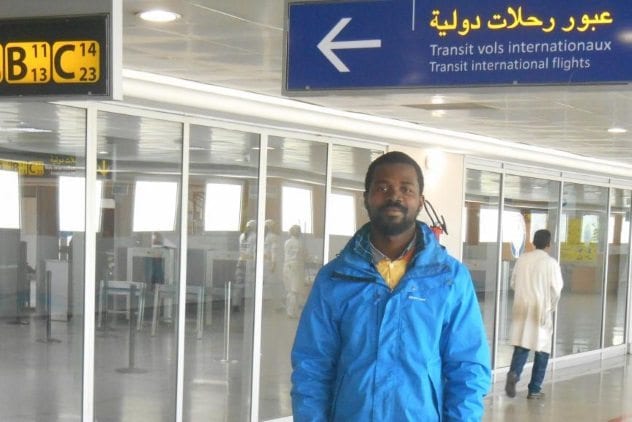
Kokoba de Jacques was a refugee from Ivory Coast. After traveling for several months, he decided to live in Morocco. He registered as an asylum seeker in 2012, and he was allowed to stay in the country.
Two years later, de Jacques requested authorization to leave, and it was granted. He spent four days visiting fellow refugees in Mauritania before returning to Morocco. Airport officials would not let him back into the country, however. They asked him to show proof of his residence and financial resources, and de Jacques showed them the documentation. They still wouldn’t let him into the country.
De Jacques was stuck in the airport. He wasn’t allowed to leave the transit zone, and they wouldn’t even let him get his luggage. He only had €100, which was spent on food. His money ran out after three weeks, and airport employees brought him bread and cheese to eat.
Luckily, de Jacques had his computer, and he could talk to relatives. He managed to get in contact with a lawyer, and a court ordered his release. The airport did not comply with the order for a week. When de Jacques was finally freed from the airport, he had spent 43 days sleeping on cardboard boxes. He was given no explanations or apologies.
6 Anthony Delaney

In 2004, Anthony Delaney lost his job and his home. He couldn’t find a new job, and he became desperate. He only received £236 a month from the government—not enough to survive. Delaney didn’t want to sleep on the streets, so he went to a local airport and made it his home. He slept, ate, and showered there. He only left to collect his Jobseeker’s Allowance.
Officials didn’t like Delaney living in the airport, so they banned him. Delaney didn’t leave; the airport was the only place where he could be “clean, dry, and warm.” He was arrested several times. The courts pitied him at first. Then they learned that he’d been caught shoplifting CDs, and he admitted that he had stolen passengers’ baggage. Delaney spent a few months in jail. He went back to the airport after he was released.
Delaney had spent more than three years of his life living in the airport when he was arrested for the fifth time. The judge gave him a year to sort out his life, or he would be imprisoned. This time, he managed to get his life in order. He found an apartment, a girlfriend, and a job.
5 Fadi Mansour
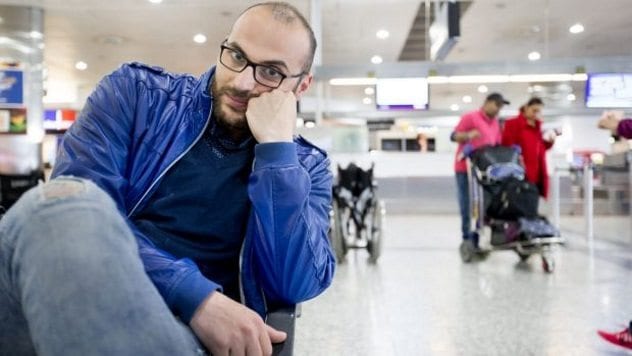
Fadi Mansour fled Syria in 2012, due to the civil war. He was facing compulsory military service. He went to Turkey, although he made plans to leave when he found out that Syrians were barred from legal work.
He bought a fake passport and boarded a flight to Germany. The plane stopped in Malaysia, and they realized that his passport was fake. Mansour was sent back to Turkey. Turkish officials tried to send him back to Malaysia, but Malaysia refused to accept him. He was sent back to Turkey again.
Mansour was detained in the Problematic Passengers Room, a small space he shared with 40 other people. There were no beds, no windows, and no privacy. Another detainee disagreed with Mansour’s religious beliefs, and he tried to convince other people to kill Mansour. Mansour was attacked three times.
After the last attack, Mansour tried to escape the airport. He managed to board a plane to Lebanon, but Lebanese officials caught him and returned him to Turkey.
In the end, Mansour spent a year in the Turkish airport before Australia offered him asylum. Mansour was reunited with his family, who had been granted humanitarian visas.
4 Sanjay Shah
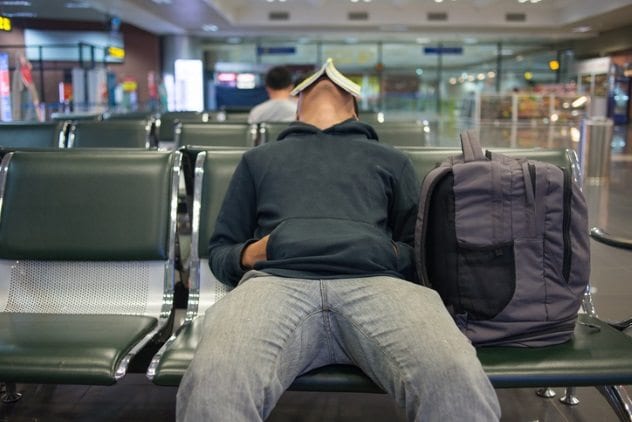
Sanjay Shah lived in Kenya, and he wanted to emigrate to England. He was eligible for a British Overseas citizen passport because he was born in Kenya when it was under colonial rule. Shah was allowed to apply for full citizenship, but he did not fill out the required paperwork before he left for England in 2004.
Shah arrived in England without a return ticket, and he had little money. Believing that he intended to stay in the country, airport officials stamped “prohibited immigrant” on his passport and sent him back to Kenya.
However, Shah had already renounced his Kenyan nationality. Kenya does not allow dual citizenship, so Shah had surrendered his Kenyan passport when he left the country. Shah was afraid that if he left the airport, he would be arrested and imprisoned. Kenyan officials later told him that he could leave the airport, but he worried that to do so would hurt his chances of becoming a British citizen.
Shah stayed in the airport. He ate cafeteria food, slept in lounge chairs, and showered in the restrooms. His wife and son brought him food and clothes every few days. After he had spent 13 months living in the airport, Shah was granted full British citizenship. He soon traveled to England, and he stayed with his sister until he managed to support himself.
3 Hiroshi Nohara

In 2008, Japanese tourist Hiroshi Nohara boarded a plane bound for Brazil. The plane had a layover in Mexico, and Nohara missed his flight, so he decided to stay in the Mexican airport. Nohara had money and a return ticket home; he just wanted to stay in the airport.
Weeks passed, and Nohara refused to budge. Both Japanese and Mexican officials tried to convince him to leave. He refused, and they couldn’t force him to leave, as he wasn’t doing anything illegal. His visa allowed him stay in the country for six months, and there was no law that said he couldn’t stay in the airport.
At first, Nohara frightened passengers, but people warmed to him. They brought him food and drinks, and he became a local celebrity. Tourists would take his picture and get his autograph. He was interviewed, and he said that he had no reason for staying in the airport.
After he had spent three months in the airport, a woman named Oyuki took pity on him. She offered Nohara a chance to sleep in a real bed. He left the airport with her.
2 Ahmad Family

Hasan, Gulistan, and their four children lived in Syria. After their city was attacked by multiple suicide bombers, the family decided to flee the country in 2015. The four oldest family members had Iraqi passports, but the two youngest didn’t. The family acquired Syrian passports through Hasan’s nationality.
They decided to travel to Russia, where Gulistan’s sister lived. The family was issued Russian visas, and they boarded their plane. But when they arrived in Russia, Russian authorities said that the visas were fake. Then they said that the passports were fake, and they confiscated them. The family was accused of trying to illegally cross the border. Russia rejected their asylum.
The Ahmads were trapped in the airport. They made a home in a disused smoking cubicle, a glass box that was next to the waiting lounge. They couldn’t go outside. If they left the airport’s transit zone, it would have constituted an illegal crossing of the border. They could have been arrested and sentenced to six years in prison.
The Ahmads had to rely on the kindness of strangers to survive. People gave them food, water, money, and toys for the children. Their living conditions were poor, and Gulistan became sick. She was sent to the hospital. Two police officers guarded her ward.
Someone took pity on the family and paid for them to sleep in a nearby hostel, though Russian officials would not let them stay there during the day. Syrian officials soon confirmed the family’s passports. The family was granted temporary asylum and were recognized as refugees. After 50 days in the airport, they could legally stay in Russia.
1 Mehran Karimi Nasseri
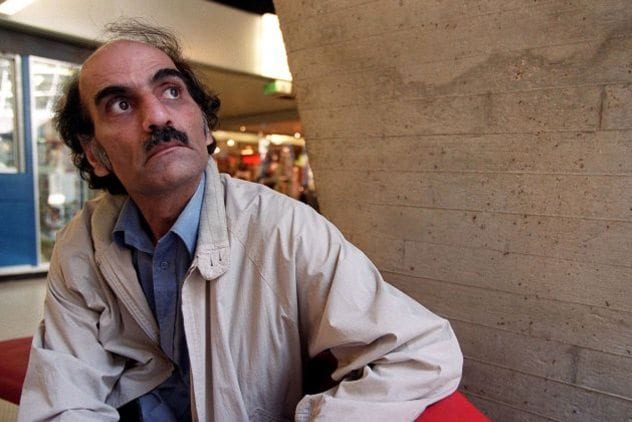
Mehran Karimi Nasseri was expelled from Iran in the 1970s. He lived in Belgium for a while before he decided to emigrate to England, where he had once studied. Nasseri boarded a plane that was headed to England via France. Unfortunately, he lost his refugee papers when someone stole his briefcase. He arrived in England, but he was sent back to France. However, French officials refused to let him enter the country without his papers, but they wouldn’t let him leave, either. Authorities told him to wait in the airport lounge while they figured his situation out. He waited for years.
Nasseri made his home in the basement shopping mall of the airport. He claimed two red benches for himself. They were large enough for him to sleep somewhat comfortably, and he was given pillows and sheets. During the day, he sat on the bench and spent his time people-watching. Many took pity on him, and they donated money and food. He was given many books and newspapers, which helped to pass the time.
After 11 years, a lawyer finally managed to get Nasseri travel documents. He could live in France or travel anywhere. However, he refused to sign the papers, as they listed his nationality as Iranian; Nasseri believed that he was half-British. He continued to live in the airport for another seven years.
Nasseri became ill in 2006 was hospitalized. When he was released, the Red Cross looked after him, and he was put into a hotel. He was not allowed to return to his airport.








